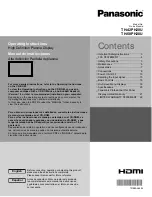
- 7 -
Observe the manufacturers instructions when
connecting extension leads to the TV. Check
the fuse rating on the new plug, this should be
fitted with a 5 Amp fuse which conforms to ei-
ther ASTA or BSI (BS1 362) approvals, these
are easily identifiable by either the
or
symbols. If you are in any doubt about the in-
stallation of an extension lead, please consult
a competent electrician.
DON’Ts
DON’T
continue to operate the equipment if
you are in any doubt about it working normally,
or if it is damaged in any way switch off, with-
draw the mains plug and consult your dealer.
DON’T
place water filled vessels on top of T.V.
cabinets.
DON’T
remove any fixed cover as this may ex-
pose dangerous voltages.
DON’T
leave equipment switched on when it is
unattended unless it is specifically stated that
it is designed for unattended operation or has
a stand-by mode. Switch off using the switch
on the equipment and make sure your family
know how to do this. Special arrangements
may need to be made for infirm or handi-
capped people.
DON’T
use equipment such as personal ste-
reos or radios so that you are distracted from
the requirements of traffic safety. It is illegal to
watch television whilst driving.
DON’T
obstruct the ventilation of the equipment,
for example with curtains or soft furnishings.
Overheating will cause damage and shorten
the life of the equipment.
DON’T
use makeshift stands and NEVER fix
legs or stands to the TV with any screws other
than those provided - to ensure complete safety
always use the manufacturers approved stand
with the fixings provided.
DON’T
allow electrical equipment to be ex-
posed to rain or moisture.
ABOVE ALL
• NEVER let anyone, especially children
push anything into holes, slots or any
other opening in the case - this could re-
sult in a fatal electric shock.
•
NEVER guess or take chances with elec-
trical equipment of any kind - it is better to
be safe than sorry!
1. Power Source
The receiver should be operated only from a
220-240V AC, 50 Hz.
outlet. Ensure you se-
lect the correct voltage setting for your conve-
nience.
2. Power Cord
The power supply cord should be placed so
that it is not likely to be walked on or pinched
by items placed upon them or against it. Pay
particular attention to cord where it enters
the plug, power outlet, and the point where it
exits from the receiver.
3. Moisture and Water
Do not use this equipment in a humid and
damp place (avoid the bathroom, the sink in
the kitchen, and near the washing machine).
Do not expose this equipment to rain or wa-
ter, as this may be dangerous and do not
place objects filled with liquids on top. Avoid
from dripping or splashing.
4. Cleaning
Before cleaning, unplug the receiver from
the main supply, outlet. Do not use liquid or
aerosol cleaners. Use soft and dry cloth.
5. Ventilation
The slots and openings on the receiver are
intended for ventilation and to ensure reli-
able operation. To prevent overheating,
these openings must not be blocked or cov-
ered in anyway.
6. Lightning
In case of storm and lightning or when go-
ing on holiday, disconnect the power cord
from the wall outlet.
7. Replacement Part
When replacement parts are required, be sure
the service technician has used replacement
parts which are specified by the manufacturer
or have the same specifications as the origi-



























